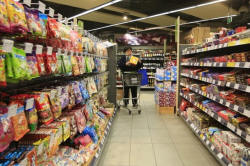|
Less noodles, beer and
movies? Clouds on Chinese consumption horizon
 Send a link to a friend
Send a link to a friend
 [April 03, 2017]
By Donny Kwok and Adam Jourdan [April 03, 2017]
By Donny Kwok and Adam Jourdan
HONG
KONG/SHANGHAI (Reuters) - Official numbers may suggest a rosier 2017 for
China, but the bottom lines of the country's top consumer firms - from
brewers to noodle makers and cinema chains - paint a patchy picture of
spending in the world's second-largest economy.
Tsingtao Brewery Co Ltd, China's number two brewer, posted its steepest
drop in net profit in 20 years last week, blaming tough competition and
weak demand. Noodle maker Tingyi saw profits drop by a third.
China's top cinema operator Wanda Cinema Line saw 2016 profits rise 15.2
percent - down from growth of nearly 50 percent the year before, as
broader box office sales stalled. IMAX China's profit tumbled, too.
"There's still a tonne of room for growth, but these markets are much
more competitive now and even bigger brands are starting to struggle,"
said Ben Cavender, Shanghai-based principal at China Market Research
Group.
"Consumers are becoming more cagey about how they're spending their
money, (from) food to clothing and movies."

Increased caution - and sophistication - will push companies to
innovate, and to spend more to fend off competitors, if they are to
survive, analysts said.
After growing at the slowest pace in 26 years in 2016, official data
have indicated a strong start to the economy this year, supported by
bank lending, a government infrastructure spree and a much-needed
resurgence in private investment.
But China's consumption trends have been less clear.
Retail sales in December rose at their fastest pace in a year, thanks to
cars and cosmetics, but they disappointed in the first two months of
this year.
Consumption contributed the bulk of China's growth last year at nearly
65 percent, but income growth didn't pick up, and a measure of China's
income inequality rose slightly last year.
A private business survey last month showed growth in the services
sector slowed to a four-month low as increasing competition made it
harder for companies to pass higher input costs on to consumers.
To be sure, the picture from recent earnings reports is not
comprehensive nor uniform.

[to top of second column] |

A customer selects products at a supermarket in Shanghai, February
10, 2015. REUTERS/Aly Song

But
the drop in profits of some of China's best-known names flags the uneven nature
of the country's gradual shift to a consumer-driven economy, and the challenge
for both brands and Beijing, which needs to stoke domestic consumption and
private investment to fuel growth.
Of
course there were bright spots.
In areas like sports apparel, firms such as Li Ning Co Ltd and ANTA Sports
predicted a boost as China looks to build its sports industry and consumers
become increasingly health conscious. Li Ning's profits rose sharply.
But global uncertainties - from the impact of trade policies under new U.S.
President Donald Trump to political uncertainty in Europe - are expected to
cloud the year.
In
2017, great uncertainties in the economic outlook remain in view of the changes
in political and economic policies in some key regions," China Resources Beer
<0291.HK> said.
The brewer reported sluggish sales growth, but also its first annual profit in
three years this month.
Retailers also reported a mixed outlook, although a slowdown in e-commerce was
creating opportunities elsewhere.
White goods maker Qingdao Haier, which posted annual net profit growth of 3.1
percent, said China was in a new normal of consumer growth - but expects sales
to eventually accelerate with rising salaries and demand for high-tech homes.

Others bore the cost of change: home appliance retailer GOME posted a 73 percent
drop in full-year profit as it spent on a strategic shake-up.
"Looking into 2017, it is expected that (the Chinese) and global economy will
continue to face downward pressure, leading to sluggish market demand," said
Chairman Li Dongsheng of television maker TCL Multimedia.
(Reporting by Adam Jourdan in SHANGHAI and Donny Kwok in HONG KONG; Editing by
Kim Coghill)
[© 2017 Thomson Reuters. All rights
reserved.] Copyright 2017 Reuters. All rights reserved. This material may not be published,
broadcast, rewritten or redistributed. |